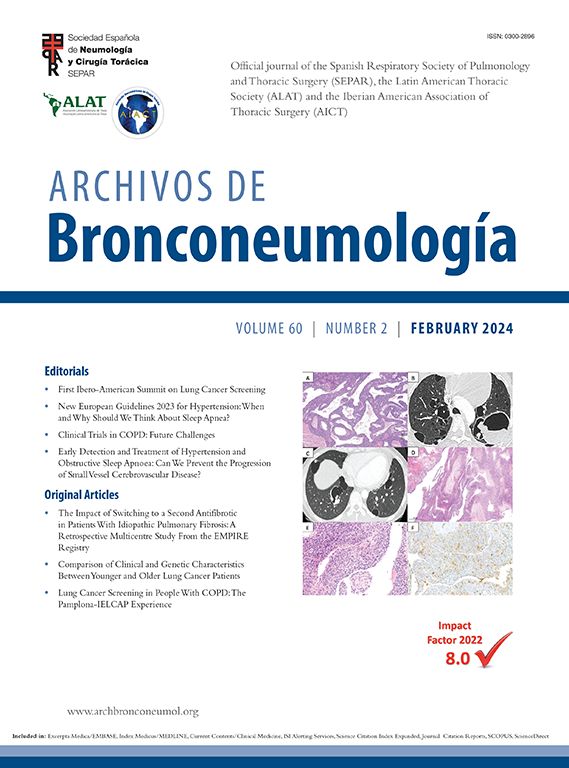抗体介导的免疫反应对慢性阻塞性肺病、哮喘和肺功能的影响:孟德尔随机化研究》。
IF 8.7
3区 医学
Q1 RESPIRATORY SYSTEM
引用次数: 0
摘要
导言:抗体介导的免疫反应对慢性阻塞性肺病(COPD)、哮喘和肺功能影响的确切原因仍不清楚。我们描述了抗体介导的免疫反应与慢性阻塞性肺病、哮喘和肺功能之间的关系,最终达到预防或治疗的目的:我们从已发表的全基因组关联研究中获取了汇总数据,包括抗体介导的免疫反应、慢性阻塞性肺病、哮喘、第一秒用力呼气容积(FEV1)、用力呼气容积(FVC)和 FEV1/FVC。双向双样本泯灭随机化(MR)分析用于评估抗体介导的免疫反应、慢性阻塞性肺病、哮喘、第一秒用力呼气容积(FEV1)、用力呼气容积(FVC)和第一秒用力呼气容积(FEV1/FVC)之间的因果关系:结果:共发现 20 种抗体介导的免疫反应对慢性阻塞性肺病、哮喘、FEV1 和 FVC 有显著的因果关系,其中 6 种表现出反向因果关系。重要的是,在抗多瘤病毒 2 IgG 血清阳性和水痘带状疱疹病毒糖蛋白 E 和 I 抗体水平对慢性阻塞性肺病、哮喘、FEV1 和 FVC 风险的因果效应方面,五项 MR 分析的结果几乎相同:本研究采用双样本 MR 设计,调查了抗体介导的免疫反应与慢性阻塞性肺病、哮喘和肺功能等呼吸系统疾病之间的因果关系,为现有知识做出了贡献。主要发现有助于识别这些疾病的高危人群,促进早期预防和诊断。本文章由计算机程序翻译,如有差异,请以英文原文为准。
Effect of the Antibody-mediated Immune Responses on COPD, Asthma, and Lung Function: A Mendelian Randomization Study
Introduction
The precise cause of antibody-mediated immune responses on chronic obstructive pulmonary disease (COPD), asthma, and lung function remains unclear. We characterized the relationship between antibody-mediated immune responses to COPD, asthma, and lung function, ultimately achieve the prevention or treatment.
Methods
We obtained summary data from published genome-wide association studies, including antibody-mediated immune responses, COPD, asthma, forced expiratory volume in the first second (FEV1), forced expiratory volume (FVC), and FEV1/FVC. Bidirectional two-sample mendelian randomization (MR) analysis was used to assess causal relationships of antibody-mediated immune responses, COPD, asthma, FEV1, FVC, and FEV1/FVC.
Results
A total of 20 antibody-mediated immune responses were identified have a significant causal effect on COPD, asthma, FEV1, and FVC, with six exhibiting reverse causality. Importantly, the results of the five MR analyses were almost identical with respect to the causal effect of anti-polyomavirus 2 IgG seropositivity and varicella zoster virus glycoprotein E and I antibody levels on the risk of COPD, asthma, FEV1, and FVC.
Conclusions
This study contributes to existing knowledge by investigating the causal relationship between antibody-mediated immune responses and respiratory conditions, including COPD, asthma, and lung function, using a two-sample MR design. The key findings can aid in identifying individuals at risk of these conditions and facilitate early prevention and diagnosis.
求助全文
通过发布文献求助,成功后即可免费获取论文全文。
去求助
来源期刊

Archivos De Bronconeumologia
Medicine-Pulmonary and Respiratory Medicine
CiteScore
3.50
自引率
17.50%
发文量
330
审稿时长
14 days
期刊介绍:
Archivos de Bronconeumologia is a scientific journal that specializes in publishing prospective original research articles focusing on various aspects of respiratory diseases, including epidemiology, pathophysiology, clinical practice, surgery, and basic investigation. Additionally, the journal features other types of articles such as reviews, editorials, special articles of interest to the society and editorial board, scientific letters, letters to the editor, and clinical images. Published monthly, the journal comprises 12 regular issues along with occasional supplements containing articles from different sections.
All manuscripts submitted to the journal undergo rigorous evaluation by the editors and are subjected to expert peer review. The editorial team, led by the Editor and/or an Associate Editor, manages the peer-review process. Archivos de Bronconeumologia is published monthly in English, facilitating broad dissemination of the latest research findings in the field.
 求助内容:
求助内容: 应助结果提醒方式:
应助结果提醒方式:


